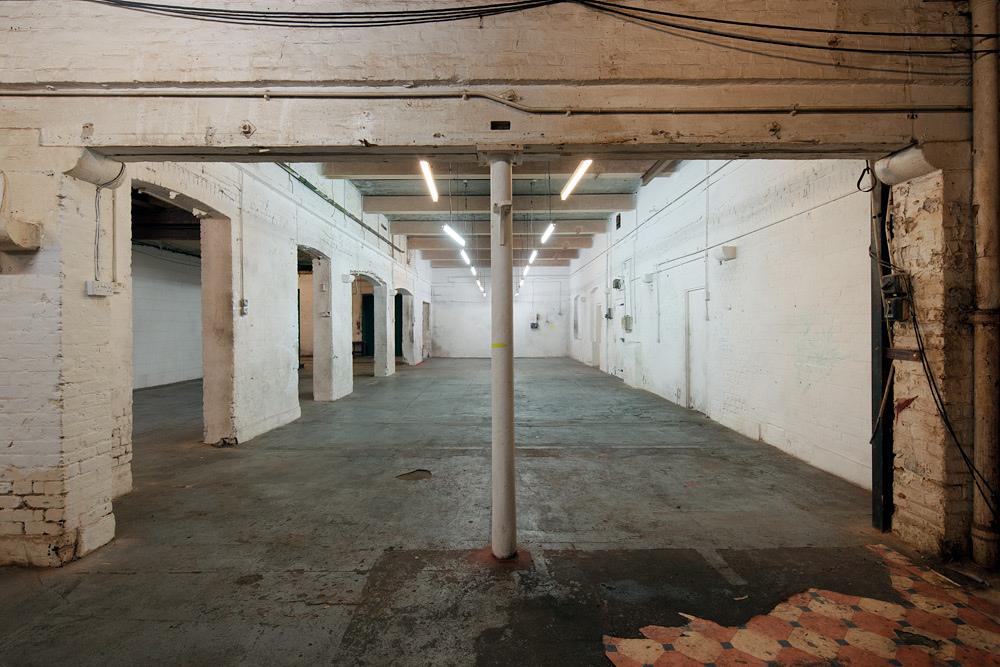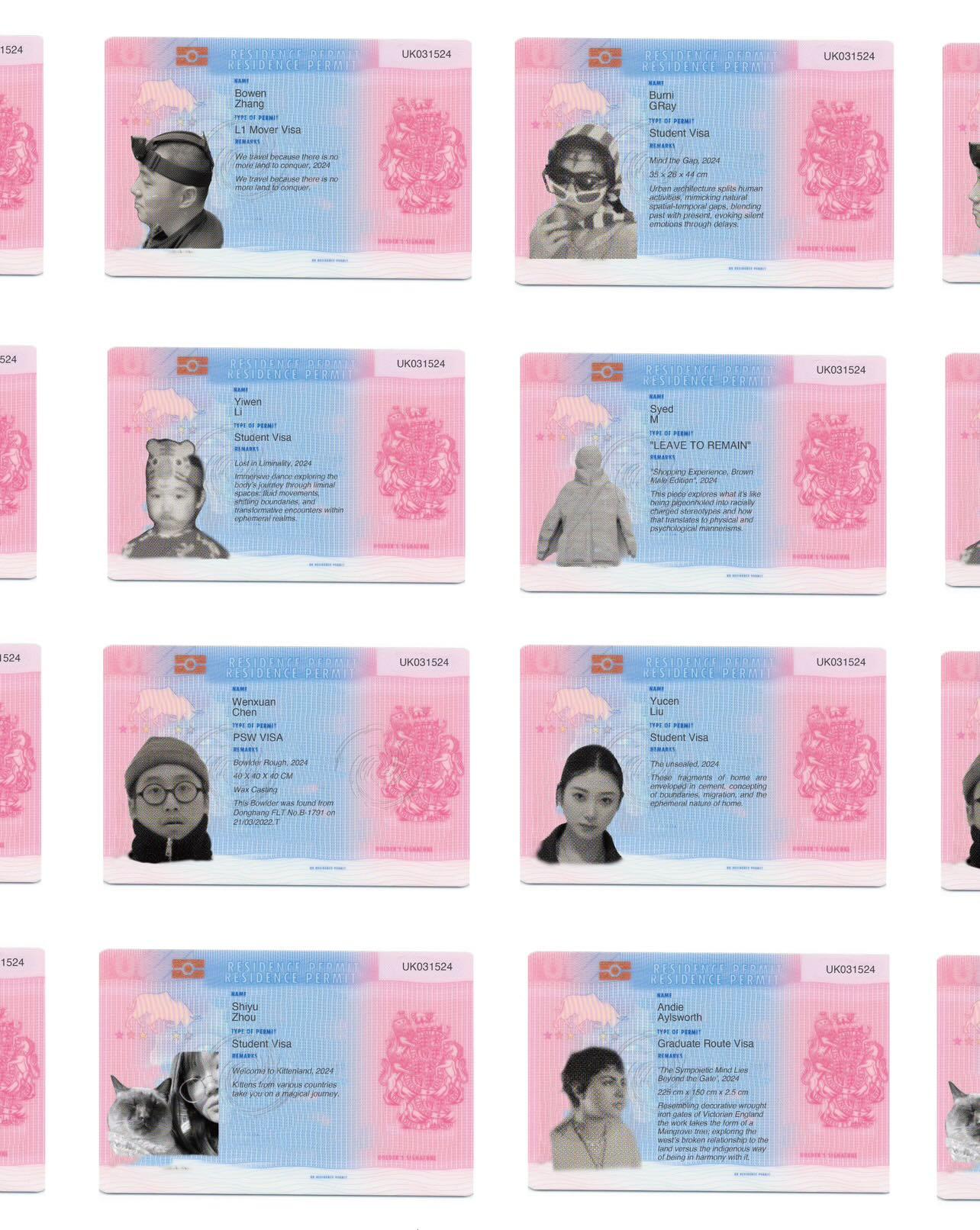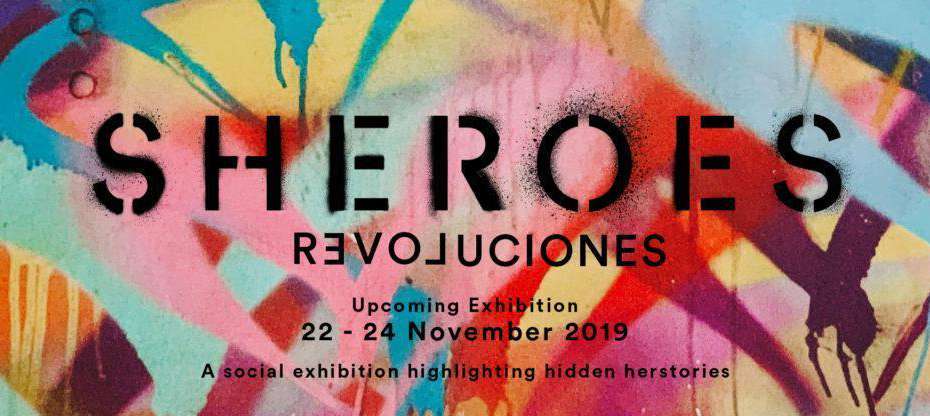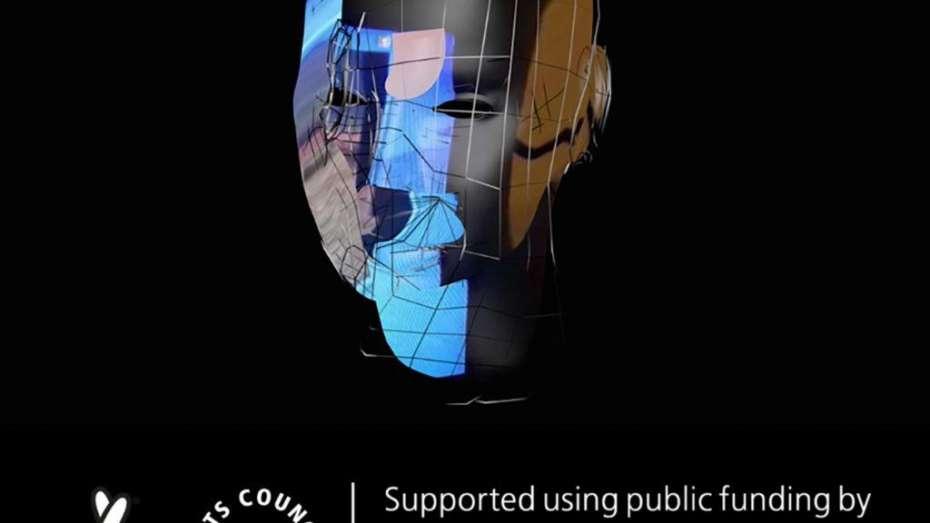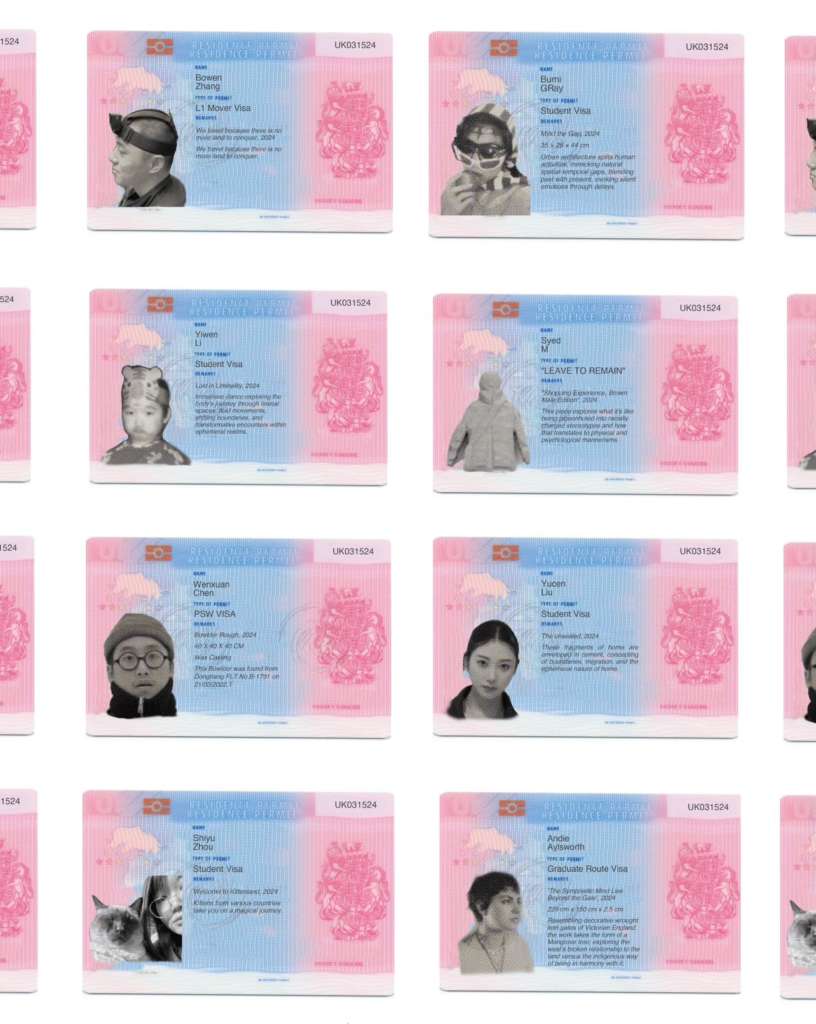
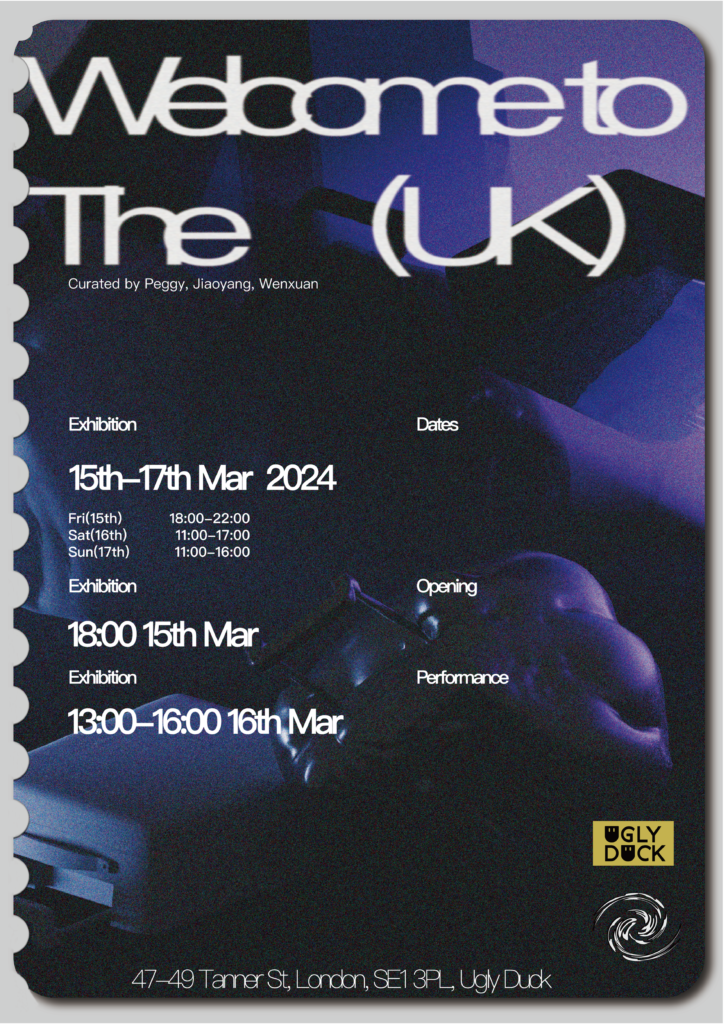

Artworks:
As part of our 2024 season Tactics of Resistance we’ll be focusing in March on the politics of VISA policies and their impact in the art and on artists through two projects. Kicking off with Welcome to the UK on March 15 – 17th, giving space to a curatorial group inquiring into the material, affective, performative, spatial and identity politics of cross-border human mobility through a tangible practice that zooms in the intricate border infrastructures entangled with people’s everyday lives, via a figurative space – a pop-up airport.
We caught up with curators Peggy, Wenxuan, Jiaoyang about their show

Tell us a little about yourself, what is your practice as an artist like?
Wenxuan: I’m Wenxuan Chen, an artist and curator. My work spans sculpture, installations, and video. Currently, I’m particularly focused on painting.
Peggy: I like things that is memeable with a semi cursed touch. At the moment, my main practice is painting.
Jiaoyang: I’m more used to calling myself a lay artist than an artist. My patchwork is the intersection with computational culture, queer theory and the philosophy of technology, around quotidian technological objects. I’m fascinated by these admixtures of high tech and low theory
What drew you to this project in particular? What are you wanting to achieve with it?
Peggy: At first it was as simple as me wanting to put on a show for our Global Talent Visa application. I invited Jiaoyang to join. We then thought about curating a show related to our shared identity- creatives with a UK visa. And then we realised Wen happened to have a similar exhibition idea so the story began.
Wenxuan: My initial idea for this project actually originated over a year ago. At that time, I was preparing for my graduation project, and I suddenly realised that I would need to consider an additional step compared to my previous creations. I wanted the materials and dimensions of the works I produced to be as small and light as possible. This was because if I created large and heavy pieces, in the event that I didn’t continue to stay in the UK, I would need to pay expensive shipping fees to transport my work back to my home country. This led me to contemplate how the creative process of overseas artists is likely influenced by visas and uncertain living situations, potentially resulting in entirely different works than before.
Jiaoyang: It’s fair to say this project came out of “chit-chat”. In the beginning, we just discussed our life situations and strategies for the life plan according to visas. We realised the visa almost became a prerequisite. and we found there are a lot of people like us, which bring a lot of common feelings. We call ourselves Part-time artists, as the visa policy dictates our work, identity and life. When you open the Home Office web page and go through the visa conditions one by one, the essence of your life is gone.I think this is a status of this time, a part of sociopolitical concern, about how the lives of us people are being shaped here and now. The project is a response to all this. I want the intersubjectivity to be captured and archived.

Welcome to the UK includes work from over 40 artists!
What was the selection process like? What do you find exciting about having the work of so many artists in one place?
Wenxuan: We aim to inclusively represent diverse communities and ethnicities, seeking the participation of as many artists as possible in our experimental exhibition. Viewing the entire exhibition as a performative act, I believe that involving more artists will imbue the showcase with greater potency.
Peggy: Since I was back in Taiwan for holiday/updated my visa ,We had to go through all the submissions separately and vote on Notion built by Jiaoyang, our Notion queen. And then we finalised our selection based on the voting via zoom call. It was a very “international” process. For the show, I am very excited having so many artists from different backgrounds/ nationalities and art practices to all be in one place to share their life story, their practice and how they live under the frame of visa.
Jiaoyang: The work of the whole selection process is massive!! I created over 10 databases to select, categorise and organise the vast amount of information we received, making it possible for the process to run in a steady way. A big difficulty in this process was that all 3 of us were working part-time on the curatorial work, and it was difficult for us to meet up and get together at a time when everyone was free. We had to put all work online and break the limits of time and space and ensure all information/updating shareable and real-time. We went through with each submission, left our individual comments/notes on a sharing page and discussed and made decisions together. We selected what we aspired to see based on multiple dimensions as the relevance of the proposal to the theme of this show, feasibility, and the conception of the entire work/proposal. By relinquishing top-down curatorial control, we hope to serve the participating artists as well as we can. Yes, that’s right, the service. The whole process was advanced through countless communications and discussions.
As mentioned in the last question. When I see so many people sharing their own stories, I feel so reassured that “Oh, I’m not the only one”. What was most exciting was reading everyone’s detailed telling of their stories and ideas, the texts that made up something that crossed different societies, borders, and policies. And of course, the artwork was part of what left me in awe and admiration!

How are you finding the London environment creatively as emerging artists? Does that have anything to do with your decision to make this into such a huge and varied collaboration?
Jiaoyang: Yes, they are related. The logo of Welcome to the UK is a vortex as London, a giant vortex that swirls everyone in. London has a remarkably rich cultural resource, it’s a place that gathers people from different places, people who bring a lot of things here, people who mould London’s creative environment, its productivity, its influence and so on. The existence of Ugly Duck as such is an example of this, to provide opportunity for queer and underrepresented artists to communicate ideas, in London and London only. On the other hand, there seems to be a bit of over-saturation of capacity, where the total amount of opportunities is greater than elsewhere, but when averaged out over individuals, the opportunities are few and far between. In the face of the visa policy, it is a necessity that has led to this decision, to bring about some unexpected connections, and to encourage creativity and art to continue to flourish in the environment in which we are.
Peggy: London for emerging artists is an exciting place. It is a city built by the essence of internationals. I feel like there’s space for everyone and chances to be seen. And most importantly you get to build up your own community no matter how niche your interests are. I don’t think it has a direct link to do with our decision to make this into such huge & varied collaboration. Perhaps, I’d say London, by its nature force, brought three of us together as well as the opportunity to get selected by Ugly Duck in their new curator programme to put on such a big show which I feel super grateful to be here.
Wenxuan: As an emerging artist, I believe that the art scene in London is brimming with opportunities but also steeped in competition. This has prompted me to contemplate the fact that every year, tens of thousands or even hundreds of thousands of students come to the UK to study art. Many talented artist friends of mine have returned to their own countries after completing their studies in the UK without getting substantial opportunities. In the art world, we belong to a group of “marginalised communities” that are often overlooked. The impact of visa issues and uncertain status on artists’ creative processes is certainly worthy of discussion.
What can audiences expect with regards to the immersive elements of this work? What do you want them to be thinking and feeling when they leave that space?
Jiaoyang: 3 points to look for, one is that the whole space will be turned into an airport. 2nd, the artists will come with their luggage in tow, the luggage is the heart of the show, part of what each piece contains, which symbolises the sub-stability between leaving and remaining. 3rd, the process of installing the work will be part of the show. I hope to bring something different to the experience of audiences. When it’s over, hope people will get a sense of the wildness, roughness and rawness that we unabashedly present, as well as the radical attitude that is part of this.
Wenxuan: I’ve participated in many small-scale exhibitions in London and observed that many artists transport their works to the exhibition venue in suitcases. This was the inspiration behind our entire exhibition revolving around suitcases. I hope that the audience can perceive the relationship between artists and their works from this exhibition – how the works are constructed and presented by the artists. Additionally, exploring how suitcases, as a “space within a space,” constrain artists’ creativity and how artists endeavour to surpass this “space” to allow their works to “unfold.”
Peggy: They can expect to see the process of artists unpacking their “luggage” live. I don’t have any expectations on how they should be thinking and feeling when they leave the space. So long as they come to the show I am happy I am more interested in how they feel about the show after leaving the space.
Thank you so much for taking the time to answer our questions!
